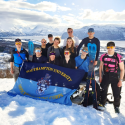In April 2019, a group of officer cadets (OCdts) from Southampton University Officer Training Corps (SUOTC) took part in a skiing exercise in the Norwegian Arctic. The aim of the exercise was to qualify OCdts in Ski Foundation level 3 (SF3), which assesses the competency of skiers’ downhill skiing, avalanche awareness and rescue, navigation and ski touring, building on the skills that they have learnt in previous ski courses. The exercise comprised OCdts of a generally high capability, having already proved themselves capable in passing their SF2 courses. As such, this exercise could afford to target more demanding and challenging objectives. The Lyngen peninsular, lying on the North Coast of Norway and 3˚ inside the arctic circle, with its remote and spectacular terrain, provided this in abundance.
The challenges presented by such an ambitious exercise were considerable, especially with regards to transport and planning. The day began for most OCdts at around 2 o’clock in the morning and thus, the fact that all were present and correct for transport was an achievement in itself considering the proficiency that most university students have for lying in. A short drive up to Heathrow Airport, followed by an international flight to Oslo and a domestic flight to Tromso. During the journey OCdts were fortunate to experience flight lounges, a small luxury but one which was greatly appreciated during the long journey. The flights themselves offered spectacular views of Norway’s many fjords and mountain ranges, which served to get everyone suitably excited and perhaps somewhat apprehensive for the week ahead, during which they would have to tackle such terrain. Thus, after a smooth transition to hire vehicles at Tromso airport and a very scenic drive, the OCdts arrived in Lyngen in high spirits and eager anticipation of the week to come. Those spirits were further elevated when presented with the accommodation, practicable and cosy apartments on the shores of the fjord, which enjoyed a spectacular view of the sea and surrounding mountains.
Over the course of the week OCdts received first rate instruction from qualified forces personnel and made considerable improvement in their ski touring technique and mountain skills. Furthermore, OCdts received, and indeed some delivered, several presentations and were involved in classroom-based teaching, so they could improve their knowledge and understanding of mountain hazards, weather and avalanches, all vital to ensuring safe practice in an inherently risky environment. Unlike OCdts’ previous experience in high-altitude alpine environments such as Tignes, which ranges from around 1500 m to 3500 m, in Lyngen they were operating at a much lower altitude, from sea level up to around 1300 m. This compelled OCdts to take other factors into consideration since, although they would not have to worry about the effects of altitude sickness (AMS), there were more considerations regarding the effect of temperature and humidity on the snowpack which the OCdts had to demonstrate awareness of when planning and assessing the proposed routes. As a result, OCdts became accustomed to checking the weather and avalanche forecasts on a regular basis.
Throughout the week in Lyngen, there existed a permanent threat in the form of a persistent weak layer, buried within the snowpack. This meant that, although the risk of avalanche remained relatively low during the duration of the exercise, the consequences of an avalanche occurring could have been considerable. As such, great care was taken to manage and mitigate the risks that OCdts were exposed to. This provided OCdts with a good appreciation of the dangers of the mountains. Their involvement with the risk assessments for the tours and the planning taught the OCdts much about the process of risk assessment and management, both of which are key skills for any Officer in the British Army.
During the course OCdts were all challenged, both physically and mentally. The big climbs, blisters, aches, cramps, cold and heat all served to test OCdts and improve their fitness, resilience and leadership. Of particular significance was that all the OCdts constructed and spent a night in a snow cave. Building a snow shelter is a skill that is often practiced on SF3 courses but very rarely ever put in use, meaning that not only was it the first night in a snow cave for the OCdts, but also for the instructors.
“The skills that we learnt throughout this expedition are directly applicable to other elements of the military. Navigation, personal and group administration and risk management were key factors to operating safely within Lyngen.”
Finally, having completed their respective courses and with an impressive 100% having earned their SF3 qualification, the exercise concluded. OCdts returned to the UK in high spirits and proud of what they had achieved.
Southampton University Officer Training Corps would like to extend its thanks to the Connaught Trust, Ulysses Trust and SERFCA for their generous support to the exercise.
“This was an arduous physical trip and we had some severe conditions on some days. the OCdts had to dig deep on many occasions and I believe they are found resilience they did not know they had. Everyone worked as a team despite being different years. 50% were already joining the services, now the other 50% are too as they see what opportunities the services offer.”
Lt Col C S J Whittle VR RAVC
Commanding Officer | Southampton UOTC




